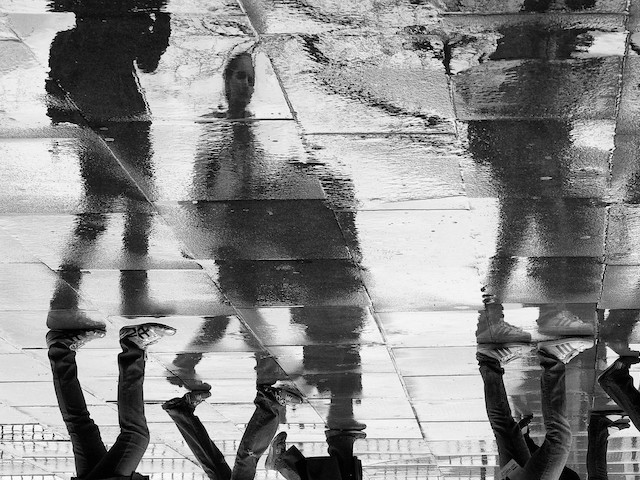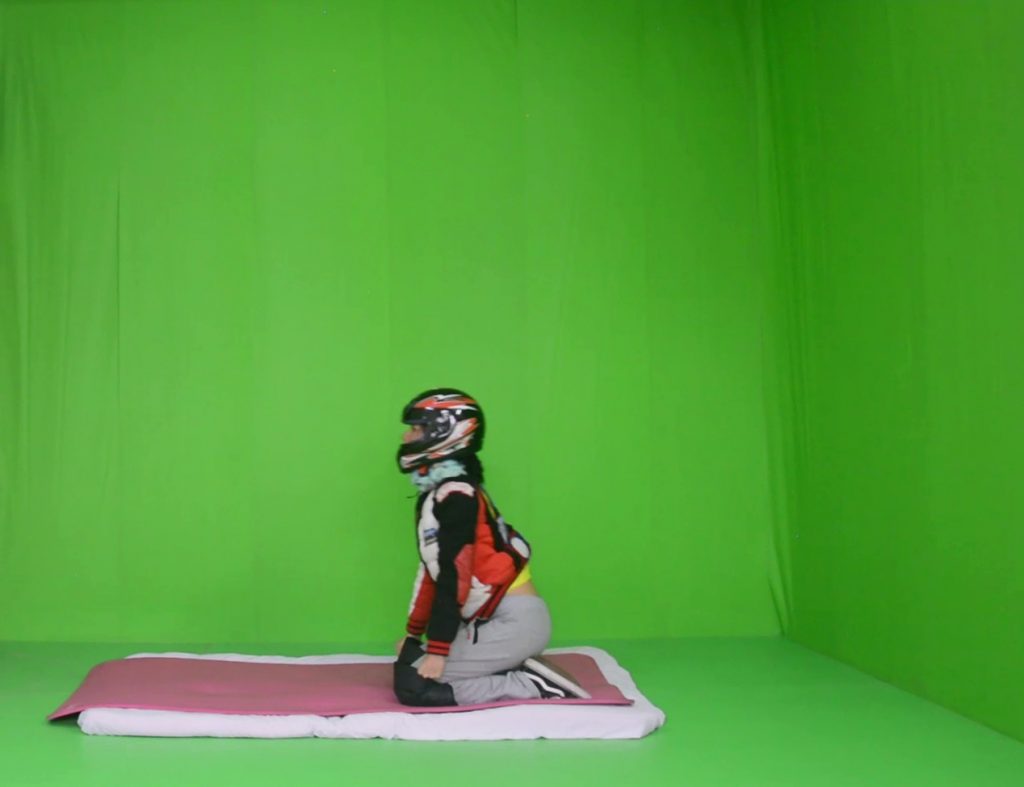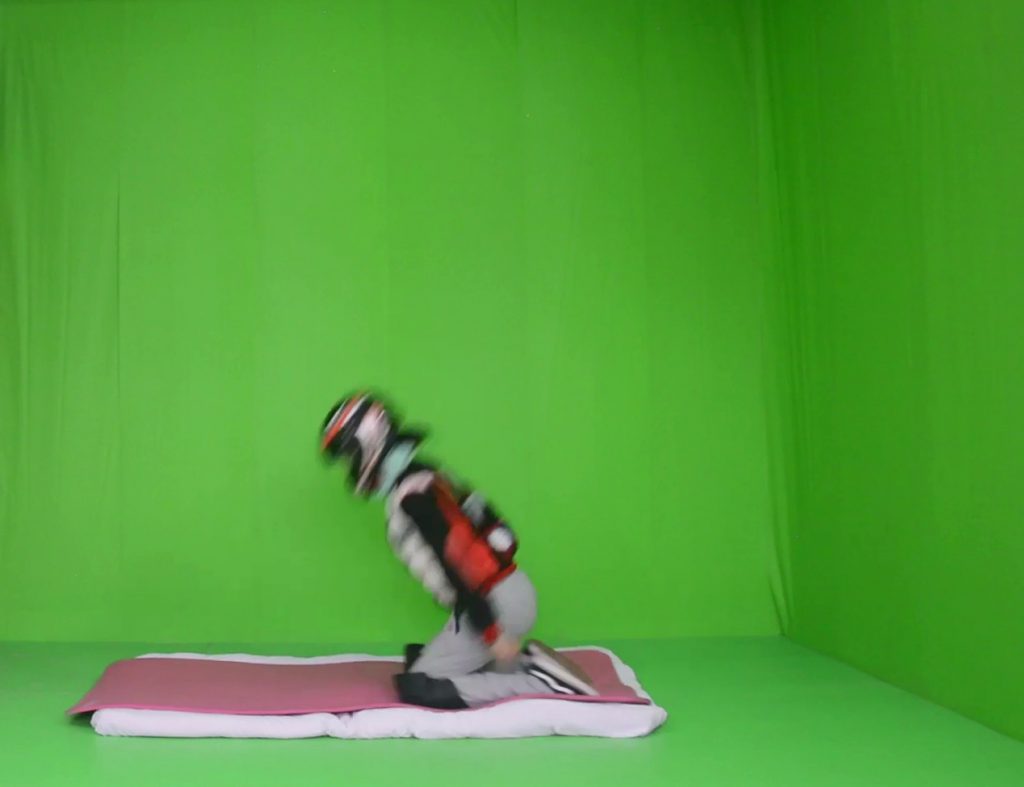People talk about the dead sometimes having unfinished business with the living, but my case was the opposite.
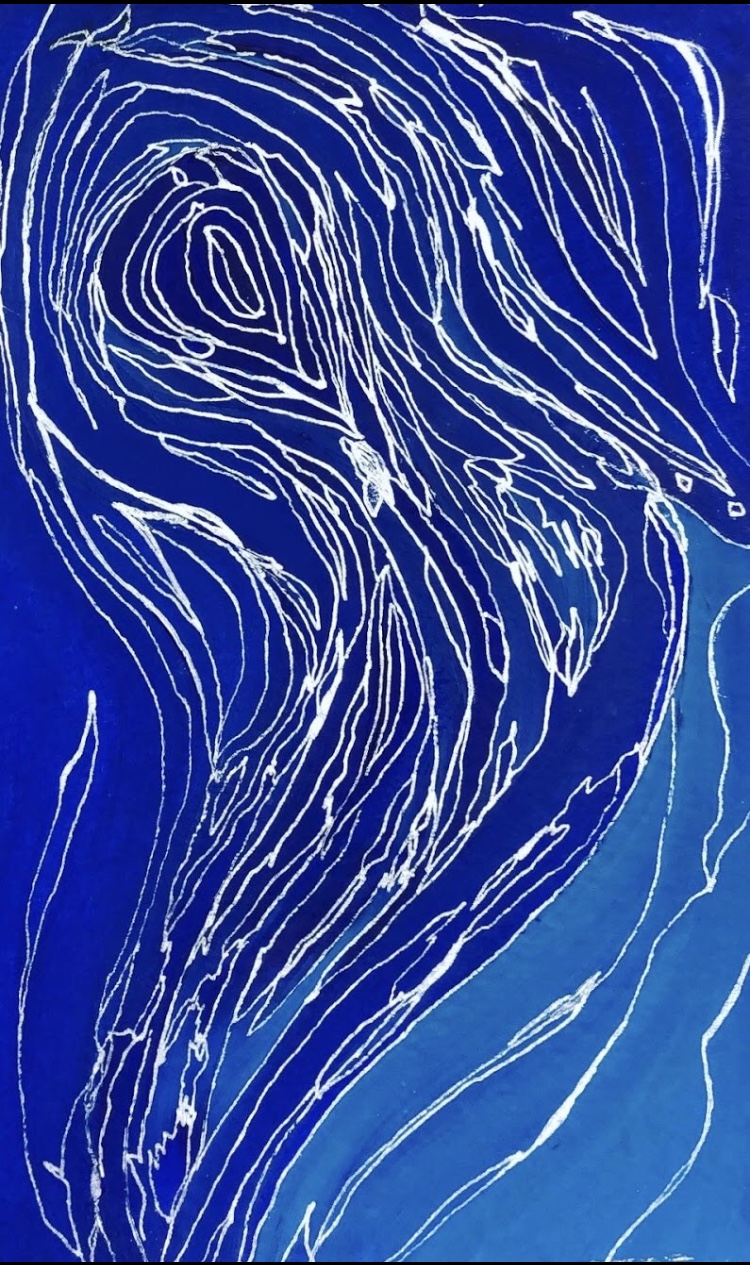
December 3, 2020
On the morning of my baptism day, I woke up before Mama and Papa. The house had that Sunday morning silence about it, and I went into Ate Luz’s room and closed the door behind me. I didn’t want my parents seeing me in there because I knew how sad it made them.
Even though over a year had passed, Mama and Papa said they weren’t ready to do anything with my sister’s bedroom yet, so it stayed exactly as it was on the day she left it, right before she was hit by that car. Mama vacuumed the carpet and dusted the shelves once a week, and she did her best to keep everything in its proper place afterwards, returning the pile of books, the backpack, and the crumpled green sweater to their respective spots on the floor. And no one was allowed to touch Ate’s copy of The Return of the King which remained open on her desk, face down, spine to ceiling, as if she would be right back to find out how it all ended.
I sat on the floor and leaned against the door because it felt wrong to sit on her bed or even on her chair, although I had seen Mama and Papa lying on her bed some nights when they thought I was asleep. Ate Luz’s walls were salmon colored and her sheets pink, a combination which Mama told her didn’t go, but which was now immortalized. She had two shelves full of books, her greatest treasures—stories about dragons and elves and mythical lands. She told me once that they made her feel at home because she didn’t always feel at home here, as if she belonged somewhere farther away. When Mama and Papa weren’t around, I’d pick one out and smuggle it into my room to read. Over the last year, I’d leafed my way through half of her library, trying to retrace her travels across those different worlds. Though most of the time it felt like playing a game of tag I could never win.
She had a map of the world over her desk with pins in it to mark all the places we’d been. Pins poked into the Philippines, where we were born. Into parts of California, where we lived now. And one each in Oregon, Hawaii, and Nevada from family vacations we’d taken. Ate Luz always dreamt of adding more to the map. I often wondered what sort of geography there was wherever she was now. Nobody ever talked about that kind of thing when they talked about heaven. About the sights one would see there, the landscape or the architecture. Whenever I asked my parents to describe it to me, they’d only repeat that it was a wonderful place, where Jesus lived, where nothing bad ever happened. Hardly anything I could latch on to in my imagination. As if she just floated in an empty sea of light. But if everything today worked out as planned, I’d finally see for myself.
At breakfast, Mama cooked me my favorite, longganisa and garlic rice, instead of the usual Sunday morning toaster waffles. She wore curlers in her hair and Papa had on the cologne he saved for special occasions. They both had big smiles on their faces.
“Why are you so quiet this morning, Reggie?” Papa said. “It’s a big day.”
“He’s just excited,” Mama said.
I was more anxious than excited, though I didn’t bother correcting her. I just nodded and filled my mouth with food.
“We’re so proud of you, anak,” Mama said, nearly tearing up.
Her son giving his life to Christ—it meant a lot to her, to both of them. My parents were lifelong Baptists, whose lives revolved around the Lord. They always wanted the same for us. And really, I did believe in Jesus and everything they taught me about him. But I didn’t tell my parents that today, I was much more focused on Ate Luz than on him.
The truth was: I needed to speak with my sister. People talk about the dead sometimes having unfinished business with the living, but my case was the opposite. And over the months since she died, this unfinished business had become a nagging, unscratchable itch inside of me. The big problem was that I couldn’t figure out how to speak with somebody who’d passed.
It might sound stupid, but until the accident, it never occurred to me how deep the gaping hole was between life and death. In TV shows and movies, people talked at a tombstone or up at a dark ceiling, as if their dead loved one just conveniently hung around waiting to be talked to. After a while, the TV character would smile, like they somehow knew that their message had gotten across, almost like they’d actually heard somebody speak back. But I tried all those things for weeks—speaking to my sister when I lay in bed looking up at my ceiling, or at her grave, or towards the sky on my walks from school. It only ever felt like talking to thin air. Which made perfect sense, because why would Ate Luz be in my room or any of those places anyway? If it’d been me who’d died, I’d want to leave all that behind. Besides, Mama said she lived in a better place now, and better was definitely not anywhere near my bedroom or the cemetery.
I asked Pastor Raymond at the church about it too. Mostly, he encouraged me to pray. He said Jesus was everywhere, so I could tell Jesus anything I wanted any time, which included asking him to pass my messages along to Ate Luz. I gave that a shot, but I still never got any word back.
I held air between my cheeks and timed myself during my classes at school, and I filled the tub every other evening before my shower and dunked my head in for as long as I could. I wanted to be sure that when I got my chance, that I’d get as much time with Ate Luz as possible.
Until my sister died, I didn’t know Pastor Raymond much. He’d only taken a special interest in me after the accident. He lost his brother when they were boys, so he said he knew what I was going through, and I guess that’s why he felt so bad for me. He took me out to get a burger every now and then, and kept telling me how God loved me very much and had a mysterious but good plan. I didn’t understand that because a bad thing happening couldn’t be a good thing no matter how you looked at it. In any case, I could tell Pastor Raymond meant well and tried his best to make me feel better, but he didn’t really give me much to work with. Not until Easter at least.
That’s when I figured it out. Some folks got baptized at church on Easter Sunday, and Pastor Raymond preached this sermon about how baptism meant following Jesus in his death and resurrection—that going into the water meant going down with Jesus into death, and then popping up out of it meant rising out of the tomb with him. You die to your old life, he said, and then you come back like new. You die and then you come back. And in between that, I reasoned, you had to be somewhere.
I asked my parents if I could get baptized, and they got really excited—thrilled that their little boy wanted to take this serious step of faith. Mostly, I just needed to find Ate Luz, so I didn’t have much of a choice. If getting put into that water took me in and out of the place where the dead go, I’d be where Ate Luz was, at least for a moment. Nobody ever stays under for more than a second when they’re baptized, but in the months since Easter Sunday, I’d been practicing holding my breath. I held air between my cheeks and timed myself during my classes at school, and I filled the tub every other evening before my shower and dunked my head in for as long as I could. I wanted to be sure that when I got my chance, that I’d get as much time with Ate Luz as possible.
On the drive to church, I kept tugging at my collar. Mama insisted that I dress nicely, in my very best, which I didn’t understand because I would be changing into gym shorts and a robe to get dunked in the water anyway. Papa gave me a nice tie to wear, and I put on the itchy jacket that I wore to Tita Maricel’s wedding.
Papa took the long way to church. He did that now. Whenever I was in the car, he avoided the intersection where the accident happened. He didn’t like me seeing it, even though I walked through it all the time, or maybe he didn’t like seeing it himself. I knew that he wanted to spare us the sadness especially today. For my parents, baptism was a real reason to celebrate—something we hadn’t had much of in the last year. And they took these milestones seriously, like they did anything that had to do with God and faith. In fact, my name itself was an act of faith on their part: Alphonse Reginald Flores del Rosario. They called me their little promise from God.
I was born in Manila, in the Philippines. I don’t remember much of it, but that was the whole point. When I was born, Mama and Papa had already begun the process of trying to migrate to the States. It was a crapshoot, a lottery, but they had faith it would happen—that God would get them here. Ate Luz was only six, but she liked to tell the story as if she actually remembered. She told me they were originally going to name me Alfonso after Lolo, Mama’s dad. But then they decided that a kid growing up American deserved an American name, a sophisticated one. Alfonso became Alphonse, and I got Reginald from my Lola Regina. Mama and Papa said they knew that God would come through and get them to California, so they named me believing I’d grow up American. I was born, prophetically, Alphonse Reginald, and imported from the Philippines that way as a fulfillment of this promise from God. But really, they just called me Reggie growing up. Ate Luz’s name—Luzviminda—was shortened, too.
There was a picture of Ate Luz on our mantle, taken right before her baptism. She’d worn a frilly pink dress that day. She was also twelve when she chose to get baptized. Mama would talk about how blue the sky was then. She’d say God wanted a clear view to get a good look at her. I looked out the car window now, and it was mostly grey outside, overcast. I wondered if it would clear up by the time it was my turn to get in the water.
By the time we reached the church, my stomach hurt. It did that when I was nervous. I’d think anyone would be if they were trying to see their dead sister for the first time in over a year. People in the foyer told me how nice I looked and how excited they were for me. I tried putting on a face, but I started to wonder what I would do if this didn’t work—if I’d gotten baptism all wrong, or if maybe I did make it to the other place but couldn’t find Ate Luz or ran out of time. And mostly, I worried that maybe she wouldn’t want to see me at all because of what she might’ve held against me for what happened.
When Pastor Raymond spotted me, he pulled me aside, gave me a hug, and said I should go to the back to get ready. In the bathroom, I changed out of my itchy clothes, and put on my gym shorts and the puffy robe he’d given me. Then I sat on the toilet and prayed. I asked Jesus to help me find Ate Luz and—just in case—to ask her not to be angry.
Four people would be baptized today, and I would be going up last. The first was Mr. Jensen, this old grandpa who had grown up in church but never got around to the whole baptism thing. The next two were this young married couple who started coming to our church a few months ago. In the sanctuary, we sat lined up on the front pew, ready to walk into the tub installed under the floorboards of the stage—they only uncovered it for these ceremonies. Pastor Raymond preached a message about following Jesus, and about how the disciples all died violent deaths, and how we shouldn’t expect being a Christian to be easy. He said the four of us getting baptized were taking a really brave step, but I didn’t feel brave, just desperate.
By the time Pastor Raymond called Mr. Jensen onto the stage, my gut was churning and that insatiable itch to see Ate Luz flared up in me, like a burning rash would feel on my soul if it had skin. I was so close. I needed to get into the water. Pastor Raymond said that Mr. Jensen was baptized in the name of the Father, and of the Son, and of the Holy Spirit, and then he brought the old man in and out from under the water. He was submerged for hardly half a second. Everyone clapped. Then it was Benny’s turn.
I wondered what Ate Luz could be doing right at that moment. Did she know I was on my way, and if so, was she waiting for me? Or maybe she’d waited too long and had given up. I was terrified that I’d be too late, that I’d miss her completely. My insides seared, and the water seemed to be tugging at me to get in.
Benny went and then Janice, the wife, started making her way to Pastor Raymond. I reached for the wall, looking for something to grab on to. But I couldn’t fight the gravity of the font. I ran onto the stage, and really it felt more like I was reeled in, like something reached out of the water and grabbed me by some invisible part I didn’t know I had. Janice was already chest-deep, and Pastor Raymond held the back of her head.
“I baptized you in the name of the Father, and of the Son—”
But I was pulled in too quickly. I took the deepest breath I could and fell right in.
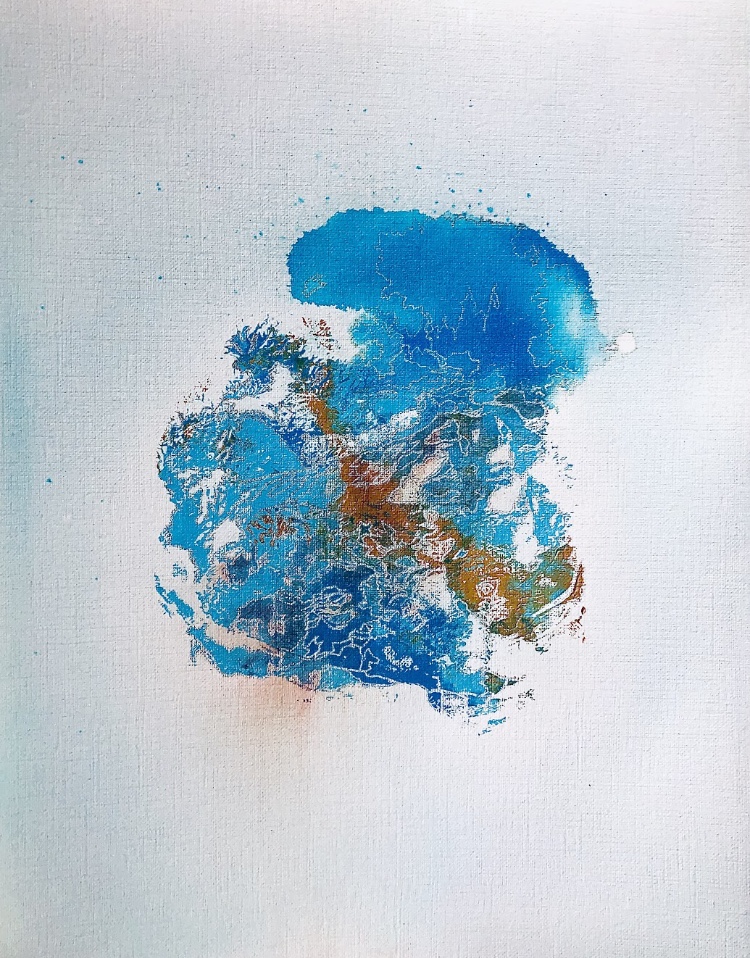
The afterlife was a hotel—complete with crystal chandeliers, red and gold carpets, the works. The lobby was bustling with people milling around it—all kinds of people, with all sorts of pants and hats and dresses on, and of different heights and skin colors. But they weren’t glowing spirits or anything like I guessed the dead would look like. Nobody had any wings. They were all just your run-of-the-mill flesh and blood people. The place wasn’t as crowded as I thought it would be, but I figured there must be multiple entry points for all those who pass on.
I wasn’t sure where to go. Most people lined up at reception, but seeing as I wasn’t checking in—just there for a visit—I wouldn’t know what to say. I didn’t have a reservation or anything. Then I noticed this kid watching me, just staring at me, confused that I looked so confused. I wondered if I’d materialized in front of him and freaked him out, but he didn’t look too scared, just amused. Like he almost expected me, as if a person appearing in this lobby out of thin air was something that happened all the time. The kid had to be about my age, maybe a year younger, wearing a soccer jersey, baggy jeans, and flip-flops. He could have been Filipino too, by the look of him.
“Hey, kid,” he said. “You looking for something?”
“My sister,” I said.
“Lotsa sisters here. You know her name?”
“Her name’s Luzviminda Maria Flores del Rosario,” I said. “She was sixteen when she came here, so she’d be eighteen now. Or maybe still sixteen. I’m not really sure how age works in this place.”
“We don’t worry about that kinda stuff too much,” he said. “It’s pretty chill up here.”
He started down one of the corridors.
“Come on. I think I know who you’re talking about. Bunch of Luzvimindas here, but only one Luzviminda Maria Flores del Rosario who might be sixteen that I know of.”
The place was fancy, five stars for sure. We walked under high ceilings, held up by marble pillars and stone arches. The hallway smelled like a garden, as if the walls were made of flowers. In some places it looked more like one of those European cathedrals than a hotel, except that it was shinier and didn’t look hundreds of years old. It hit me, too, that there weren’t many lights, but that the whole place was lit up. I couldn’t understand until I stopped to look closely at one of the pillars. Every surface of the hallway glowed, the floors, the arches, the sculptures on the walls—they all put forth this soft golden light.
The corridor wasn’t too crowded, although there were enough people that I felt lucky to have met someone who maybe knew my sister out of all the Luzvimindas here.
“You all right, bro?” he said. He stopped and tapped me gently on the shoulder.
My insides still felt knotted up, and my face must’ve shown it.
“I’m fine. This place is just something, that’s all,” I said, but I still wondered what I would do if my sister refused to see me, or if my being here would upset her. I didn’t want to make things worse.
“Yeah,” he said. “Takes some getting used to.”
The corridor brought us out into this courtyard filled with hedges in the shapes of animals. I saw a lion, an ox, an eagle, and even a sea otter. Some animals I didn’t recognize, like this long-tailed pig-looking thing and this pigeon with four wings, and I thought that maybe they were made up, but maybe they existed a long time ago or didn’t exist yet. Tables were spread throughout the courtyard where people—mostly wrinkly, and grey-haired, but some kids—played chess. The sky above us was bluer than the sky at home, like it was made of water and not just air. It was fluid, moving, full.
We kept on going until we were through the courtyard and back inside the building. Through the doors, a wide spiraling staircase wound up a million floors. I hadn’t noticed how tall the hotel was from the outside. We went up and up. Around the third floor, we passed a little boy, who must have been five at most, and I wondered for the first time how each of these people died. None of them had any scars or looked sick or anything, so they must have been cleaned up before they checked in. I thought to ask my guide how he got here, but I didn’t know if that was a rude thing to do in a place like this. Instead I asked him how long he’d been around.
“Long as I can remember,” he said.
“You ever leave?”
“Sometimes,” he said.
Before I could ask him how he did that, he said, “We’re almost there.”
We stopped on the seventeenth floor, if I counted correctly. The landing split off into half a dozen hallways each lined with gold doors. My guide led me down one of them until we reached a door colored differently than the rest—not gold but salmon.
“Get in there,” he said. “You don’t got all day.”
I stood in front of the door and tried to listen for sounds on the other side of it. I was still afraid but also excited because my sister might actually be inside. I felt a drop of water on my head, and then another. I looked up and saw the ceiling was leaking.
“Go for it, bro,” the kid said.
I knocked, softly first, then loudly.
The door opened, and there was Ate Luz. Her hair was braided, and she had on her favorite green sweater that she wore around the house and those pink pajama pants of hers. She held a book in her hand, The Return of the King, with her index finger inserted between pages, like we caught her in the middle of reading. Inside, the hotel room was a replica of her bedroom at home with her bookshelves, salmon walls, and pink sheets.
She looked more real than I remembered. Like the sister I’d held in my memory all this time had only been a colored drawing, my best guess of who she’d been.
“Ate,” I said. “It’s me.”
She pulled me inside and squeezed me.
“Of course it’s you, Reggie,” she said. “Ano ka ba? You think I don’t recognize my own brother?”
She told me to take my shoes off because of the carpet. I did and realized the floor was damp. More than damp—it was soaked, squishy.
“Ate, what’s wrong with your floor?”
“It’s flooding,” she said. “You’re underwater, don’t you remember?”
I hadn’t. She set her book on the desk and motioned for me to sit on the bed with her, so I did, leaving a sliver of space between us so our shoulders all but touched.
“Did you miss me, little brother?” she said.
I stared at her then. She looked more real than I remembered. Like the sister I’d held in my memory all this time had only been a colored drawing, my best guess of who she’d been.
“I missed you a lot,” I said.
“You’ve grown,” she said. And only then did I realize that she didn’t look any different than the day she died. “I guess it has been a while since I’ve seen you last. Time moves differently here. It’s difficult to keep track.”
“Differently?” I asked.
“Hmm,” she said, thinking for a moment. “It’s sort of like that time we went to Hawaii. We had such a hard time keeping track of the days. They blurred into each other, in all that sunshine and ocean spray. And it felt like we existed in a whole other world—that island, suspended in the middle of infinity. At least that’s how it felt. Not that this place is the same as Hawaii. Really, it’s pretty different.”
I had a hard time understanding what she meant. But I remembered that vacation, how happy we’d all been.
“Reggie,” she said. “Why’d you come all this way?”
I looked down at her floor, then at her walls and at the little pieces of her life arranged around us. I’d been practicing this for months, but the words took a long time to come.
“Ate,” I said. “Do you remember how you used to say I was the American of our family? That out of the two of us, I was the one destined to live a life in the States? Because of the prophecy and because of my name?”
“Sure, Reggie, I remember.”
“Ate,” I said. “Is that why you died and not me?”
We’d both been at the intersection. We’d been crossing at the same time. I was just a few feet—only a few feet—in front of her. That guy could have hit either one of us. But I didn’t get a scratch on me.
“I should have at least come with you,” I said. “Are you angry with me for letting you go alone?”
I wasn’t looking at her because I wouldn’t know what to do if she were mad. But she put her hand on my head and tousled my hair.
“Don’t be silly. I’m not angry. I went, and you didn’t. That’s all.”
“I know, but—”
“It’s okay, little brother. It’s okay.”
She pulled me close and put her arms around me. I rubbed my eyes. I cried, because I was hearing Ate Luz’s voice and remembered it had been a very long time since I had. She sounded like her, and she smelled like her, and she felt like her. I thought I should ask if she wanted me to stay. So we could be brother and sister again.
Before I managed to say anything, I felt cold on my toes. I opened my eyes and found my feet dipped in water. The room had flooded. Water was sliding down the walls from the ceiling. It was a whole foot deep in the room and was all the way out in the hallway, too.
“We gotta go,” the kid said in the doorway.
I didn’t want to move. I turned my face up to Ate Luz and hoped she would tell him he’d made a mistake. That we could have ten more minutes or at least five. Instead, she gave me a little squeeze then pulled her arms from around me.
“Come on, Reggie,” she said.
She placed a hand on my back and eased me gently off the bed. We waded in the water together across her room. At her doorway, she kissed me on the forehead and told me she loved me very much. I told her that I loved her too, and I hugged her one last time.
Out in the hallway, the water rushed towards the landing. The boy and I watched it cascade over the edge. Waterfalls poured down the winding staircase from all the floors above us, and a whirlpool spun below.
“Time to jump,” my guide said.
“I’m not good with heights,” I said.
“No choice.”
He grabbed my hands, then flung the both of us over the railing and into the roaring spiral.
I gasped for air as Pastor Raymond lifted me out of the water. People were standing in the pews, chattering, eyes wide, all staring at me. Janice stood on the stage, dripping wet from her chest down, her hair still dry. I found out later that I had been under for forty whole seconds. Papa said that Pastor Raymond made this huge effort to get me out, trying to wrestle me out of the water, but that I was dead set on staying underneath.
After getting dried off and changed, I heard people in the foyer whispering, “Did it count? Did it count?” I wasn’t sure if they were talking about whether it counted for me or for Janice, but I got to see my Ate Luz, so I knew it counted for me.
In the car, Mama and Papa asked what came over me, and I told them that I wasn’t sure, except that I couldn’t wait to get baptized. Mama said that she hoped I approached my walk with Jesus that way all the time, but that I should still write an apology letter to Janice.
“We’re very proud of you, Reggie,” Papa said, after a while.
“We are,” Mama said, and she promised we’d go out for a big celebratory dinner tonight—anywhere I liked.
I rested my head against the seatbelt strap, my hair still damp from the font, and watched the sky roll by outside, as grey as it’d been that morning. And I thought of Ate Luz in her salmon room—sure that my parents were thinking of her too—as Papa drove us the long way home.

